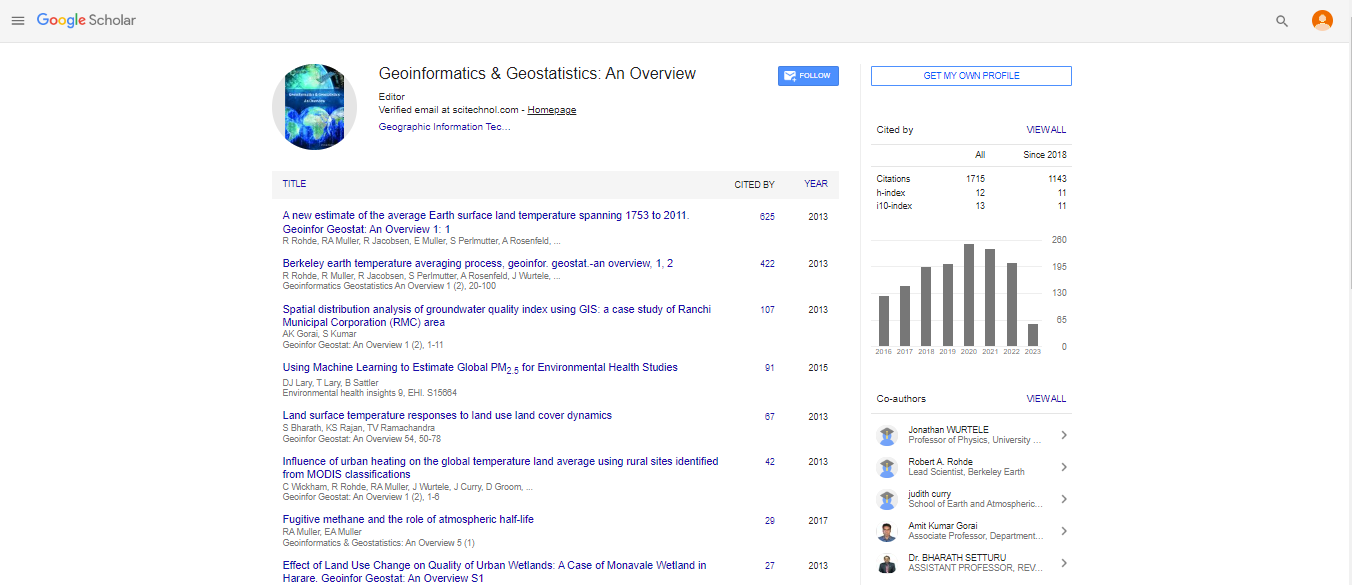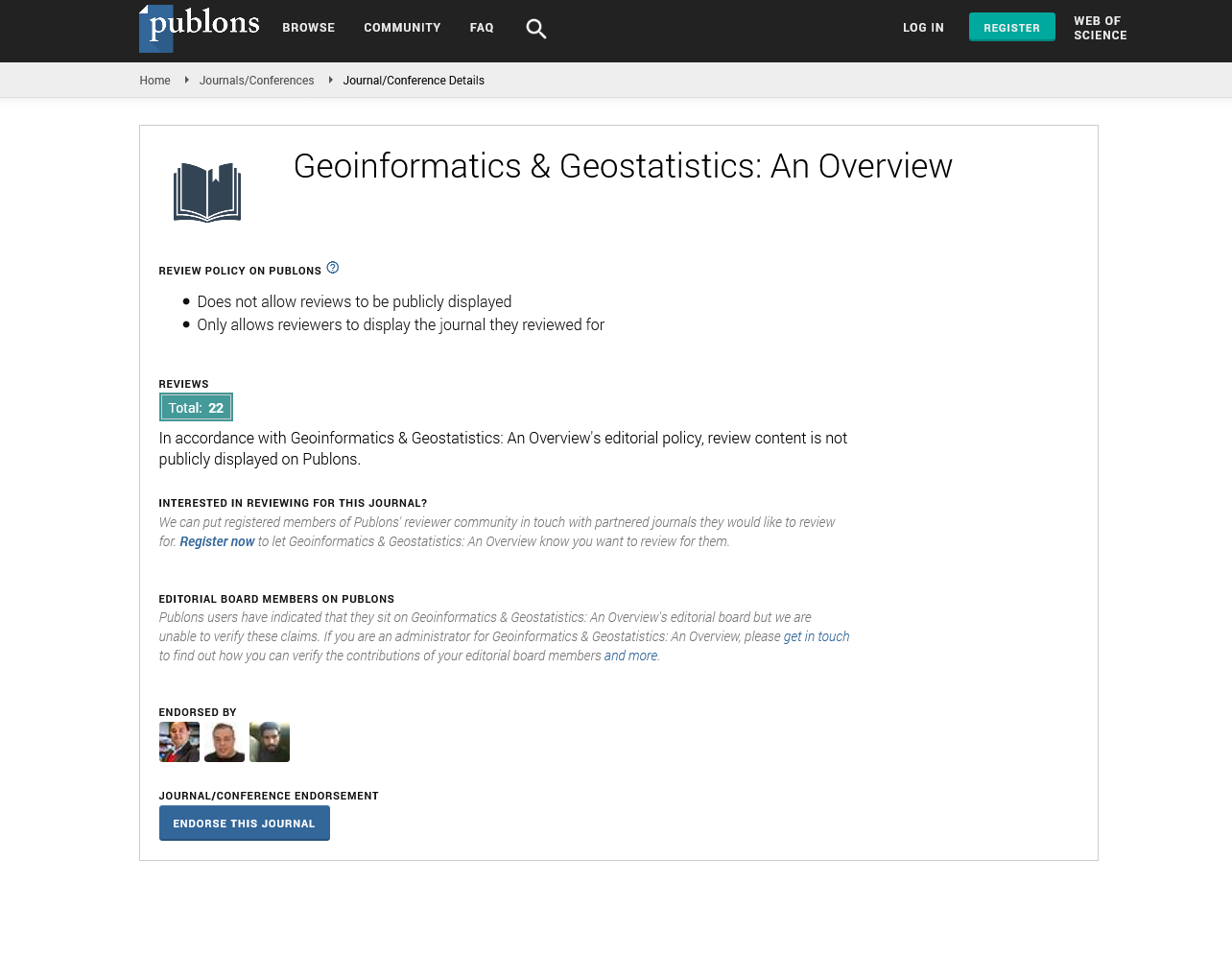Opinion Article, Geoinfor Geostat An Overview Vol: 12 Issue: 2
Coastal Adaptability: Strategies for Managing Erosion and Building Adaptation
Zheng Hiu*
1Department of Geography, University of Tokyo, Tokyo, Japan
*Corresponding Author: Zheng Hiu,
Department of Geography, University of
Tokyo, Tokyo, Japan
E-mail: zheng.hiu305@qq.com
Received date: 27 March, 2024 Manuscript No. GIGS-24-136135;
Editor assigned date: 29 March, 2024, PreQC No. GIGS-24-136135 (PQ);
Reviewed date: 12 April, 2024, QC No. GIGS-24-136135;
Revised date: 19 April, 2024, Manuscript No. GIGS-24-136135 (R);
Published date: 29 April, 2024, DOI: 10 .4172/2327-4581.1000382.
Citation: Hiu Z (2024) Coastal Adaptability: Strategies for Managing Erosion and Building Adaptation. Geoinfor Geostat: An Overview 12:2.
Abstract
Coastal erosion poses a significant threat to coastal communities, economies, and ecosystems worldwide. This manuscript delves into the causes and impacts of coastal erosion, and examines various management strategies employed to reduce its effects. From hard engineering structures to soft measures such as beach nourishment and managed retreat, a combination of approaches is often necessary to effectively manage coastal erosion and adapt to changing coastal dynamics. Coastal erosion is the gradual wearing away of land by the action of natural forces, primarily waves and currents. It is a natural process exacerbated by human activities such as climate change, coastal development, and unsustainable land use practices. The consequences of coastal erosion can be severe, including loss of property, infrastructure, and valuable ecosystems. Thus, effective management strategies are essential to minimize these impacts.
Description
Coastal erosion poses a significant threat to coastal communities, economies, and ecosystems worldwide. This manuscript delves into the causes and impacts of coastal erosion, and examines various management strategies employed to reduce its effects. From hard engineering structures to soft measures such as beach nourishment and managed retreat, a combination of approaches is often necessary to effectively manage coastal erosion and adapt to changing coastal dynamics. Coastal erosion is the gradual wearing away of land by the action of natural forces, primarily waves and currents. It is a natural process exacerbated by human activities such as climate change, coastal development, and unsustainable land use practices. The consequences of coastal erosion can be severe, including loss of property, infrastructure, and valuable ecosystems. Thus, effective management strategies are essential to minimize these impacts.
Coastal erosion can be attributed to various natural and anthropogenic factors. Natural factors include wave action, storm surges, and sea level rise, while human activities such as coastal development, sand mining, and dam construction can exacerbate erosion processes. Climate change, particularly the warming of oceans and melting of polar ice caps, is a significant driver of coastal erosion, leading to rising sea levels and increased storm intensity.
The impacts of coastal erosion are wide-ranging and can affect both human communities and natural ecosystems. Coastal erosion threatens coastal infrastructure such as buildings, roads, and ports, leading to economic losses and displacement of populations. Furthermore, erosion can degrade coastal habitats such as beaches, dunes, and wetlands, compromising their ability to provide essential ecosystem services such as flood protection, habitat provision, and carbon sequestration.
Managing coastal erosion requires a multifaceted approach that considers both engineering solutions and natural-based approaches. Hard engineering structures such as seawalls, groynes, and breakwaters are commonly employed to protect coastal infrastructure from erosion. While effective in the short term, these structures can have adverse environmental impacts and may worsen erosion in adjacent areas. Soft engineering measures such as beach nourishment, dune restoration, and vegetative stabilization offer more sustainable alternatives by enhancing natural coastal defenses and promoting sediment accretion.
Integrated Coastal Zone Management (ICZM) is a whole approach to coastal management that seeks to balance environmental, social, and economic objectives. ICZM emphasizes stakeholder engagement, interdisciplinary collaboration, and adaptive management principles to address the complex and interconnected challenges of coastal erosion. By integrating knowledge from various disciplines and considering the needs and priorities of local communities, ICZM can help develop effective and sustainable solutions to coastal erosion.
Several case studies illustrate the diverse range of coastal erosion management strategies employed around the world. Examples include the construction of seawalls in highly urbanized coastal areas such as Miami Beach, Florida, and the implementation of beach nourishment projects in places like the Netherlands and Australia. These case studies highlight the importance of context-specific approaches customized to local environmental conditions, socioeconomic factors, and stakeholder preferences.
Conclusion
Coastal erosion is a complex and pressing issue that requires urgent attention and concerted action at local, national, and global levels. While no single solution can address all aspects of coastal erosion, a combination of management strategies customized to local conditions and integrated through approaches such as ICZM can help mitigate its impacts and build adaptability in coastal communities and ecosystems. By investing in proactive planning, sustainable development, and adaptive management, we can safeguard our coastlines for future generations.
 Spanish
Spanish  Chinese
Chinese  Russian
Russian  German
German  French
French  Japanese
Japanese  Portuguese
Portuguese  Hindi
Hindi 
